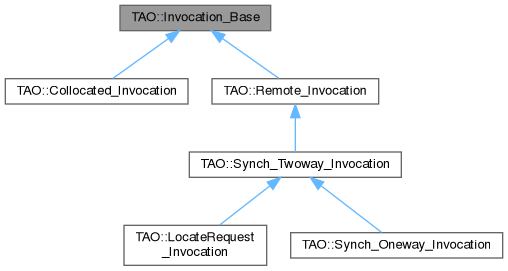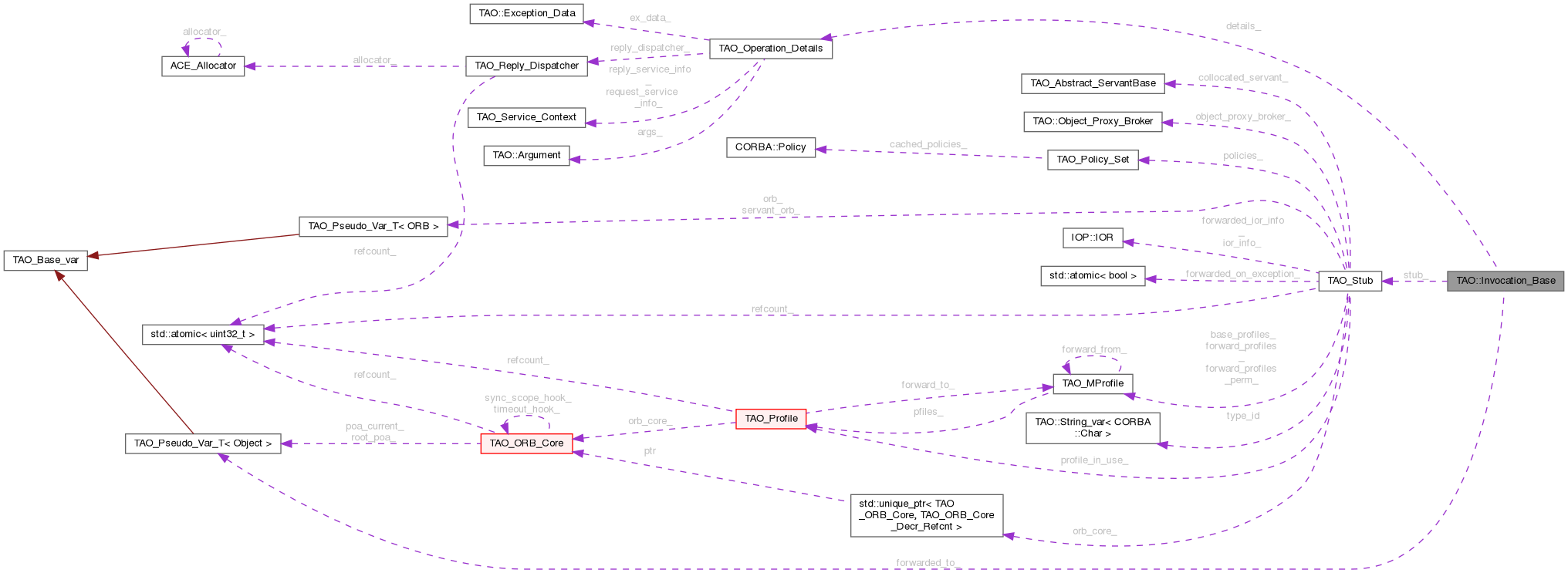The base class for the invocation object. More...
#include <Invocation_Base.h>


Public Member Functions | |
| virtual | ~Invocation_Base () |
| TAO_Stub * | stub () const |
| Accessor and mutator methods. | |
| CORBA::Object_ptr | forwarded_reference () |
| void | forwarded_reference (CORBA::Object_ptr o) |
| TAO_Service_Context & | request_service_context () |
| Accessors for the service context list. | |
| TAO_Service_Context & | reply_service_context () |
| CORBA::Object_ptr | steal_forwarded_reference () |
| Return the forwarded object location by loosing ownership. | |
| CORBA::Object_ptr | effective_target () const |
| Return the effective target of the invocation. | |
| CORBA::Object_ptr | target () const |
| Return the target object. | |
| CORBA::Boolean | response_expected () const |
| Does this invocation return a response? | |
| GIOP::ReplyStatusType | reply_status () const |
| Accessor of reply_status of the invocation. | |
| void | reply_status (GIOP::ReplyStatusType s) |
| Mutator of reply_status of the invocation. | |
| TAO_Operation_Details & | operation_details () |
| The operaton details of the invocation. | |
Protected Member Functions | |
| Invocation_Base (CORBA::Object_ptr otarget, CORBA::Object_ptr target, TAO_Stub *stub, TAO_Operation_Details &op, bool response_expected, bool request_is_remote) | |
Protected Attributes | |
| TAO_Operation_Details & | details_ |
| The operation details on which we are operating on. | |
| CORBA::Object_var | forwarded_to_ |
| Forwarded object reference. | |
| bool | response_expected_ |
| Is response expected? | |
| GIOP::ReplyStatusType | reply_status_ |
| A GIOP reply status of the invocation. | |
Private Member Functions | |
| Invocation_Base (const Invocation_Base &) | |
| Invocation_Base & | operator= (const Invocation_Base &) |
Private Attributes | |
| CORBA::Object_ptr | otarget_ |
| The original target on which the invocation was started. | |
| CORBA::Object_ptr | target_ |
| The effective target on which the invocation is on. | |
| TAO_Stub * | stub_ |
Detailed Description
The base class for the invocation object.
This class is the base of the invocation object hierarchy. This hierarchy is classified based on the type of invocation and the mode of invocation. One of the objects from the hierarchy is created on the stack for every invocation.
In addition this class encapsulates the essential details that are required for PortableInterceptors to function correctly. Further this class also provides some helper and accessor methods that are used by clients.
Constructor & Destructor Documentation
◆ ~Invocation_Base()
|
virtual |
◆ Invocation_Base() [1/2]
|
protected |
- Parameters
-
otarget The original target on which this invocation was started. target the target on which this invocation is flowing ie. the effective target op operation details of the invocation on target response_expected flag to indicate whether the operation encapsulated by op returns a response or not.
◆ Invocation_Base() [2/2]
|
private |
Member Function Documentation
◆ effective_target()
| CORBA::Object_ptr TAO::Invocation_Base::effective_target | ( | ) | const |
Return the effective target of the invocation.
Please see the PortableInterceptor specification in the CORBA spec to understand what effective target means.
◆ forwarded_reference() [1/2]
| CORBA::Object_ptr TAO::Invocation_Base::forwarded_reference | ( | ) |
Accessor and mutator methods for forwarded object locations. These access methods have to be public so that the PortableInterceptor can use them
◆ forwarded_reference() [2/2]
| void TAO::Invocation_Base::forwarded_reference | ( | CORBA::Object_ptr | o | ) |
◆ operation_details()
| TAO_Operation_Details & TAO::Invocation_Base::operation_details | ( | ) |
The operaton details of the invocation.
◆ operator=()
|
private |
◆ reply_service_context()
| TAO_Service_Context & TAO::Invocation_Base::reply_service_context | ( | ) |
◆ reply_status() [1/2]
| GIOP::ReplyStatusType TAO::Invocation_Base::reply_status | ( | ) | const |
Accessor of reply_status of the invocation.
◆ reply_status() [2/2]
| void TAO::Invocation_Base::reply_status | ( | GIOP::ReplyStatusType | s | ) |
Mutator of reply_status of the invocation.
◆ request_service_context()
| TAO_Service_Context & TAO::Invocation_Base::request_service_context | ( | ) |
Accessors for the service context list.
The service context lists are actually cached elsewhere. Providing this accessor helps the PI to access this list in both remote and collocated mode.
◆ response_expected()
| CORBA::Boolean TAO::Invocation_Base::response_expected | ( | ) | const |
Does this invocation return a response?
◆ steal_forwarded_reference()
| CORBA::Object_ptr TAO::Invocation_Base::steal_forwarded_reference | ( | ) |
Return the forwarded object location by loosing ownership.
◆ stub()
| TAO_Stub * TAO::Invocation_Base::stub | ( | ) | const |
Accessor and mutator methods.
◆ target()
| CORBA::Object_ptr TAO::Invocation_Base::target | ( | ) | const |
Return the target object.
Member Data Documentation
◆ details_
|
protected |
The operation details on which we are operating on.
◆ forwarded_to_
|
protected |
Forwarded object reference.
◆ otarget_
|
private |
The original target on which the invocation was started.
The following object reference pointers are not duplicated. They are cached for portable interceptors, and they just live for the lifetime of the request. Hence there is no point in duplicating the pointers.
◆ reply_status_
|
protected |
A GIOP reply status of the invocation.
◆ response_expected_
|
protected |
Is response expected?
◆ stub_
|
private |
◆ target_
|
private |
The effective target on which the invocation is on.
The documentation for this class was generated from the following files: